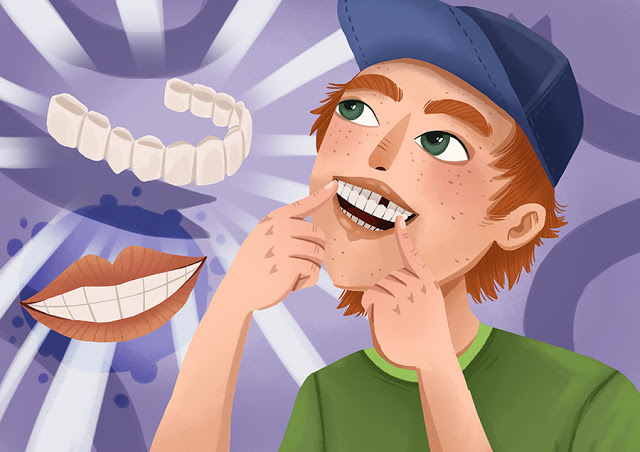 |
| How To Take Care Of Your Veneers |
Veneers and lumineers are thin
linings that transform your smile. They are fastened to your teeth with the
help of adhesives making them reliable smile makeovers. Despite this, veneers
may serve you for only 10-15 years. Some key points can help your veneers last
as long as possible.
The most important thing is to
reduce the stress on your teeth, do not bite hard vegetables and fruits. Good
oral hygiene is necessary. Visit your dentist regularly to examine your teeth,
check their condition, and conduct treatment, if necessary.
Particular attention should be
paid to composite veneers – they have a poorer fixation on teeth compared to
ceramic overlays and lumineers. Composite veneers also have a tendency to get
stained.
Eating Habits After Installing
Veneers And Lumineers
The most important thing with
veneers and lumineers is to limit the stress on the front teeth. That is, to
exclude solid products – excessive pressure can cause the plates to crack or
peel off.
– Do not bite off food: even the
softest. You need to get used to cutting the products into small pieces. This
applies to vegetables, fruits, meat, and even cookies. Chew only with lateral
teeth without overlays.
– Eat fiber food with caution. It
can get stuck in the interdental spaces and will be quite difficult to remove
with dental floss,
– Abandon the “coloring” food
(beets, red wine, black tea, coffee) or minimize its consumption. Also, give up
smoking and other tobacco product consumption. The risk of changing the shade
of veneers, especially composite and ceramic, is noticeably increased,
– Sharp changes in temperature
are forbidden, as well as too hot or cold food and drinks. This can lead to
cracking of the material, and the resorption of the composite glue. Ultimately,
the pad simply peels off.
What Tools Are Used For Proper Oral
Hygiene?
1. A toothbrush must have soft
bristles. Too stiff hair can cause cracking. Electric brushes should not be
used – vibration can cause the plastic to peel off. Such brushes use quite
aggressive bristles and even plastic elements that can damage the material,
making it rougher.
2. Toothpaste without the
addition of abrasives e.g. whitening. Such a paste can also lead to the
formation of microcracks on the surface of veneers.
3. Irrigator allows you to clean
the plaque out of the interdental spaces and the surface. Additionally, it
provides a gum massage. The mucous membranes become
saturated with oxygen and the metabolic processes are restored.
4. Dental rinse. Choose what is
right for you, taking into account the existing problems: to combat gum
disease, to reduce tooth sensitivity, to strengthen enamel (with fluoride).
Tips On Oral Hygiene
Do not forget to brush your teeth
2 times a day. Rinse your mouth after each meal. There are no prohibitions on
the use of dental floss and interdental brushes, but you need to be extremely
careful when using them. If you want to use floss – enter the tip directly into
the area between the teeth in the gum area. After cleaning, remove it in the
same way. Avoid vertical movements. Still, it’s much better to use irrigators
to remove food remnants.
The weakest part is the line
between the ceramic overlay and a natural tooth. The abrasive substances in
many pastes make this line less smooth. As a result, the leftovers of food collect
there and form plaque.
An infection can develop, so the damaged areas can no longer be restored.
Since the contours of the veneer
are ideally adapted to each patient, they can generally improve the condition
of the gums. However, sometimes inflammation occurs with ceramic veneers. The
gums begin to hurt and bleed. This is a sign of improper installation of
veneers. In such a case, you should immediately contact a cosmetic
dental clinic.
In addition, you should not
postpone a trip to the cosmetic dentist if the veneers cause discomfort and
inconvenience, loose fit to the teeth. Roughness and gaps in the places of
attachment to the tooth are the results of incorrect installation. If the veneer
has broken off, or tooth decay has appeared on open teeth, be sure to see a
doctor.
